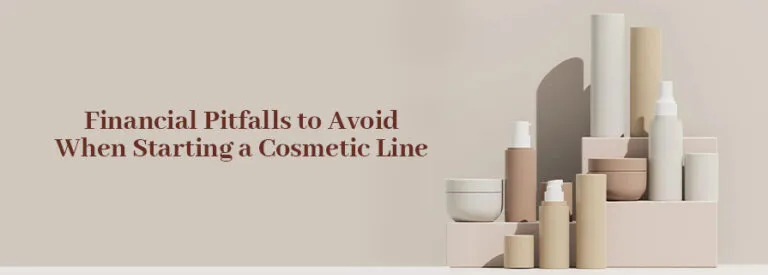Financial Pitfalls to Avoid When Starting a Cosmetic Line

Imagine – You’ve perfected your dream skincare formula in your kitchen, friends rave about your homemade lip balms, and you’re convinced you’re the next beauty mogul.
Fast forward six months ,you’re drowning in unexpected costs, struggling with cash flow, and wondering where your ₹15 lakh investment disappeared. Sound familiar? You’re not alone.
Introduction
The cosmetic industry in India is experiencing explosive growth, with the market witnessing 25% annual growth and projected to reach $20 billion by 2025. However, behind every successful beauty brand are countless stories of financial missteps that could have been avoided with proper planning.
Financial planning proves crucial for cosmetic startups because unlike other businesses, cosmetics involve complex manufacturing processes, stringent regulatory requirements, and significant upfront investments before seeing any revenue.
Understanding Cosmetic Manufacturing in India
Role of Cosmetic Manufacturers in India
Cosmetic manufacturers in India serve as the backbone of the beauty industry, offering diverse services from formulation development to packaging and compliance. The landscape includes established giants and emerging specialists catering to different market segments.
Understanding your manufacturing options early prevents costly mistakes later. The three primary types of cosmetic manufacturing companies include private label manufacturers offering ready-made formulations, third-party manufacturers providing custom solutions, and contract manufacturers offering comprehensive end-to-end services.
Estimating Cosmetic Business Startup Costs
Cost of Starting a Cosmetic Business in India
The cost of starting a cosmetic business in India varies dramatically based on your approach. Minimum viable startups require ₹5-10 lakhs, while comprehensive launches demand ₹25-50 lakhs or more.
Common Hidden Costs in Cosmetic Business Startup Costs
The biggest financial trap? Hidden costs that blindside entrepreneurs. Beyond obvious expenses like manufacturing and packaging, cosmetic business startup costs include regulatory compliance (₹2-8 lakhs), quality testing (₹1-5 lakhs per product), intellectual property protection (₹50,000-3 lakhs), and working capital for 6-12 months operations.
Insurance, legal consultations, website development, inventory storage, and unexpected reformulation costs can easily add ₹5-15 lakhs to your budget.
Private Label vs Third Party Manufacturing
Benefits of Private Label Cosmetic Manufacturers
Private label cosmetic manufacturers offer the fastest path to market with lowest initial investment. You can launch products within 4-8 weeks with investments starting from ₹2-8 lakhs depending on product range and quantities.
Pros & Cons of Third Party Cosmetic Manufacturers in India
Third party cosmetic manufacturers in India provide greater customization but require higher minimums and longer timelines. While you gain product uniqueness, expect 12-20 week lead times and ₹10-25 lakh initial investments.
Factors Affecting Third Party Cosmetic Manufacturing Cost
Third party cosmetic manufacturing cost depends on formulation complexity, packaging requirements, minimum order quantities, and testing needs. Custom formulations can cost 2-4x more than standard formulations, while unique packaging adds 50-200% to base costs.
Choosing the Right Manufacturing Partner
Regional Manufacturing Hubs
Cosmetic manufacturers in Delhi offer proximity to regulatory bodies and diverse supplier networks. Cosmetic manufacturers in Gujarat provide cost advantages and excellent logistics infrastructure. Each region offers distinct benefits affecting your overall costs.
Identifying Top Cosmetic Manufacturers in India
Top cosmetic manufacturers in India distinguish themselves through certifications, client portfolios, and transparent pricing. However, premium manufacturers often require higher minimums, potentially straining startup budgets.
Understanding Contract Manufacturers for Cosmetics
Contract manufacturers for cosmetics offer comprehensive services but demand substantial commitments. While they provide end-to-end solutions, their minimum engagement levels often exceed startup requirements.
Budgeting for Cosmetic Manufacturing
Smart Strategies for Cosmetic Business Financial Planning
Effective cosmetic business financial planning requires allocating 40-50% for manufacturing, 25-30% for marketing, 15-20% for operations, and maintaining 15-25% contingency reserves.
Allocating Funds Across Functions
Successful allocation involves phased investments: initial product development (₹3-8 lakhs), market testing (₹2-5 lakhs), scaled production (₹10-25 lakhs), and growth capital (₹15-50 lakhs).
Common Cosmetic Line Startup Mistakes to Avoid
Top Cosmetic Line Startup Mistakes
The most expensive cosmetic line startup mistakes include underestimating regulatory compliance costs, overcommitting to inventory, choosing inappropriate manufacturers, neglecting market testing, and inadequate cash flow planning.
Financial Traps and Overspending Pitfalls
Common overspending occurs in premium packaging (adding 100-300% to costs), excessive product range launches, expensive celebrity endorsements, and over-investing in fancy offices rather than core business needs.
Another critical mistake involves underpricing products. Many entrepreneurs fail to account for all costs, resulting in unsustainable business models despite strong sales.
Conclusion
Final Tips for Financial Success
Launching a financially sound cosmetic brand requires realistic budgeting, conservative cash flow projections, and strategic manufacturer selection. Start lean, test thoroughly, and scale gradually.
Key success factors include maintaining 6-12 months operating expenses in reserve, choosing manufacturers aligned with your growth stage, investing in proper legal and regulatory guidance, and focusing on core products before expanding ranges.
Remember: in cosmetics, slow and steady wins the race. The brands that survive their first three years are those that prioritized financial discipline over rapid expansion.
Frequently Asked Questions
Q: What’s the minimum realistic budget for starting a cosmetic line in India?
A: ₹8-15 lakhs for a lean private label start, including all hidden costs and 6-month operating capital.
Q: How do I choose between cosmetic manufacturers in different regions?
A: Consider total cost of ownership including logistics, regulatory proximity, and long-term scalability rather than just manufacturing costs.
Q: What percentage should I budget for unexpected costs in cosmetic business startup? A: Allocate 25-30% contingency budget for regulatory surprises, reformulation needs, and market testing iterations.
Q: How much working capital do I need for cosmetic business operations?
A: Budget 6-12 months of operating expenses as working capital, typically ₹3-8 lakhs for small-scale operations.
Q: What’s the biggest financial mistake cosmetic startups make?
A: Underestimating total time-to-revenue and running out of cash before achieving sustainable sales levels.
Q: How can I reduce third party cosmetic manufacturing costs effectively?
A: Start with standard formulations, use shared packaging options, commit to reasonable volumes, and build long-term manufacturer relationships.
